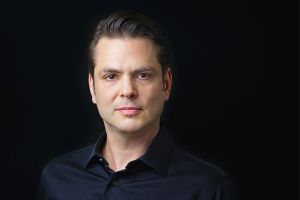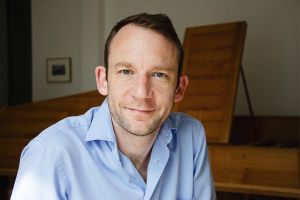Das neue Studienjahr 2020/21 an der mdw erlebt die Geburt eines neuen Instituts für Alte Musik. Ein Gespräch mit dem Leiter Stefan Gottfried und dem stellvertretenden Leiter Eugène Michelangeli über ihren Zugang zur historisch informierten Aufführungspraxis und die ersten Vorhaben der neuen Einrichtung.
Wie alt ist eigentlich der Begriff Alte Musik, und warum ist er entstanden?
Eugène Michelangeli (EM): Ich gehe davon aus, dass es immer eine ältere Musik gab, die man Alte Musik hätte nennen können. Was ich heute darunter verstehe, ist eine Musik, die dem klassischen Kanon nicht entspricht, weil sie zum Beispiel aus einer früheren Zeit ist oder ein starkes Bedürfnis nach besonderem Instrumentarium oder unüblichen Spieltechniken hervorruft.

Stefan Gottfried (SG): Der Gedanke, dass Musik irgendwann „alt“ wird, zieht sich durch die ganze abendländische Musikgeschichte. Das „Neue“ war immer das Interessante, stand aber oft im Widerspruch zu konservativen, meist von der Kirche vertretenen Tendenzen. Daneben war „alte“ Musik immer auch fester Bestandteil des Musiklebens. Das Interesse für vergangene Musik im großen Stil war aber dem 19. Jahrhundert vorbehalten, in dem neben Mendelssohns legendärer Wiederaufführung von Bachs Matthäuspassion auch die entstehenden Gesamtausgaben u. a. von Schütz, Bach und Händel das große Interesse und auch das Bedürfnis nach Identifikation mit der eigenen Tradition widerspiegelten. Alte Musik im heutigen Verständnis ist aber ein Begriff des 20. Jahrhunderts und meint damit einen ganz speziellen Zugang: nämlich der Versuch, sich der Musik über die Beschäftigung mit Quellen und dem damals verwendeten Instrumentarium und seiner Spieltechnik, so wie sie gedacht und gehört wurde, anzunähern. Voraussetzung einer solchen Herangehensweise ist die Überzeugung, dass Musik zu unterschiedlichen Zeiten unterschiedlich empfunden wurde und dafür unterschiedliche Klangmittel benötigte und dass ein Sich-darauf-Einlassen das eigene Musizieren bereichert und vertieft. Man taucht darin ein und entdeckt so die Diversität der „klassischen“ Musik Europas. Man beginnt dabei, neue musikalische „Sprachen“ zu lernen und sich darin auszudrücken.
Warum gibt es eigentlich in der „historischen“ Aufführungspraxis so gegensätzlich klingende Interpretationen, wenn sich doch alle auf dieselben historischen Quellen beziehen?
SG: Das ist eine ganz wesentliche Frage und hat vielschichtige Gründe. Prinzipiell kann man sagen, dass sich Menschen in jeder Sprache ganz unterschiedlich und unverkennbar ausdrücken, obwohl sich alle an die gleichen grammatikalischen Regeln halten. Genauso in der Musik – vor allem in einer Epoche, die ihr musikalisches Tun ganz analog zur Sprache verstanden hat und für die das „Reden mit Tönen“ selbstverständlich war. Ein anderer Grund ist natürlich der, dass man wie in jeder historischen Forschung immer nur ein sehr unvollständiges Bild vergangener Wirklichkeiten gewinnen kann. Das wird erst recht zum Problem in einem Feld, wo es um die Erforschung von Klang-Wirklichkeiten geht. Da kann jede schriftliche Quelle nur sehr begrenzt Aufschluss geben. Das ändert sich schlagartig in der romantischen Aufführungspraxis-Forschung, wo frühe Klangdokumente einen ganz anderen Erkenntnisgewinn ermöglichen. Schließlich taucht nicht nur in der „Schlamperei der Tradition“, wie Mahler das einmal formulierte, sondern auch in der Historischen-Aufführungspraxis-Bewegung das Phänomen auf, dass manche sehr gut dokumentierte Aspekte nicht umgesetzt werden. Ein Beispiel: Man weiß von zwei Händel-Oratorien, wie lange Händel selbst dafür gebraucht hat (er hat es in seine Dirigierpartitur eingetragen). Trotzdem sind alle gängigen Aufnahmen, auch aus dem Bereich der Alten Musik, weit entfernt davon; sie benötigen alle viel mehr Zeit. Da schafft man es eindeutig nicht, an das Tempogefühl eines Komponisten anzuknüpfen; für uns musiziert Händel anscheinend viel zu schnell. Das gibt schon sehr zu denken, und es entsteht die Frage, wie weit man sich heute wirklich darauf einlassen will und kann. Da fehlt es oft an der Überzeugung und dem Mut, alte Gewohnheiten (auch in der Alten-Musik-Szene) aufzugeben und die „Komfortzone“ zu verlassen.
EM: Die historische Aufführungspraxis ist eine Anschauung, eine Denkweise, die sicher keine fertige, absolute Wahrheit liefert. Man sollte daraus keine homogene Produktion erwarten, sondern hoffen, dass die Interpret_innen so wahrhaftig wie möglich diesen Weg einschlagen, und dabei weiterhin immer neue Erkenntnisse gewinnen.

Was soll das neue Institut für Alte Musik an der mdw leisten? Auf welche bestehenden Strukturen am Haus kann es sich stützen?
EM: Alte Musik ist seit den Anfängen unserer Ausbildungsstätte ein Begriff. Die Gründung eines neuen, ganz diesem Bereich gewidmeten Instituts, ist eine wichtige Voraussetzung, um eine weitere Entwicklung zu ermöglichen. Es geht darum, alle Kräfte der Universität in diesem Gebiet zu bündeln und zu erweitern, um die Exzellenz der mdw auch in diesem Feld weltweit greifbar zu machen.
SG: Das Institut für Alte Musik soll Kompetenzzentrum und Schnittstelle für alle Alte-Musik-Aktivitäten an der mdw sein. Dabei sollen die vielfältigen Verbindungen u. a. mit der Interpretationsforschung, den Instrumentalinstituten, der Kirchenmusik, den Sänger_innen und Dirigent_innen sowie der Musikpädagogik intensiviert und erweitert werden. Das Schöne ist, dass es in vielen Bereichen großes Interesse dafür gibt und auch das Bewusstsein wächst, dass in der scheinbar so fixierten „Klassik“ unterschiedliche Klangkonzepte der Musik guttun.
Was sind für die erste Zeit Ihre wichtigsten Vorhaben und Projekte?
EM: Grundlegend sind Pflege und Aufbau unserer Beziehungen zu den anderen Organisationseinheiten der mdw. Eine große Stärke unserer Universität ist ihre Vielfalt. Wir wollen versuchen, uns innerhalb dieses wunderbaren Gewächs so dicht wie möglich zu vernetzen, um gemeinsam gut arbeiten zu können.
SG: In diesem Studienjahr stehen folgende Projekte auf dem Programm: Wir gestalten im März einen Auftritt im Gläsernen Saal des Musikvereins, bringen im Mai im Schönbrunner Schlosstheater zusammen mit dem Max Reinhardt Seminar Molières & Lullys Der Bürger als Edelmann auf die Bühne und präsentieren uns zu Pfingsten zusammen mit anderen in- und ausländischen Alte-Musik-Institutionen bei den Internationalen Barocktagen Stift Melk. Weiters wirken wir bei einem Projekt mit mehrchöriger Musik des 17. Jahrhunderts und bei Bachs Johannespassion (im Rahmen zweier mdw-Produktionen) mit. Dazu ergänzen Masterclasses, Workshops und Themenwochen (in diesem Semester z. B. über die französische Kantate im 18. Jahrhundert) das Angebot. Der offizielle Festakt unserer Institutsgründung findet am 18. April 2021 im Joseph Haydn-Saal statt, gefolgt von einem Symposium über das Cembalo im 16. Jahrhundert. Ein buntes erstes Institutsjahr steht bevor.

